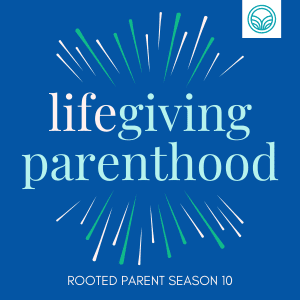One of the most frustrating kinds of storytelling is when a conflict could easily be resolved by a simple conversation. In episode 7 of Star Wars, as the Resistance is chased through space, one of their commanders, Poe, grows increasingly frustrated with the lack of action from his leader, Admiral Holdo. Eventually, unwilling to do nothing, he leads a coup to take over command.
It is later revealed that Holdo had a plan all along, and if Poe had kept quiet, everything would have been perfectly fine. Yet Holdo never told Poe. She never even hinted at her plan. While the movie portrays Poe as a hot-headed, trigger-happy soldier who should have followed orders, the viewer is left wondering, Why didn’t they just have a normal conversation?
When our children come to us with questions about a world filled poverty, war, famine, and injustice, we may join in asking why God would allow it all to happen. Answers aren’t easy, and we may feel like we’re in a movie with the same storytelling problem. “God, if you are real, can’t you tell me why there’s so much suffering? If you have a good reason, at least you could tell me, right?”
There are a few routes to take when answering this question. My hope is that by addressing it from two angles, we will reach a fuller understanding and be able to respond to our children’s questions.
The Logical Problem
This is a legitimate and perennial question—so common, in fact, that it has a name. The Epicurean Paradox goes like this: If God is all-good (omnibenevolent) and all-powerful (omnipotent), suffering should not exist, for this god both would not want suffering to exist (because he is all-good) and would be able to prevent it from happening (because he is all-powerful).
Since suffering does exist, it must mean that either God wants it to, thereby making him no longer all-good, or he cannot stop it, thereby making him no longer all-powerful. And a god who is either evil or powerless is no god at all—or at least, not worthy of my worship. Two logical problems with this are worth noting.
- If God were evil, you’d know it.
This problem relies on a faulty premise: suffering proves that God is bad. But if God, the supreme being of the universe, chose to be all-powerful at the expense of his goodness, we wouldn’t expect to even have the opportunity to speculate about his goodness! An evil god would not allow us to question his character. He would simply crush us or torture us.
If God were evil, either we wouldn’t exist, or air-conditioning wouldn’t exist. In all seriousness, though, one of the first places we can start is to invite our children to consider our common graces and comforts. This may be a step in the direction to show that God is not evil. Perhaps it is worth asking the inverse question: “In the face of all the comforts we have, how can God be bad?”
- If God were powerless, you’d know it.
Secondly, the notion that suffering proves God’s powerlessness is equally suspect. If God, the supremely good being, could not act upon his good desires, we would expect the world to be far more chaotic. The laws of the physical universe would fall apart.
Yet we still have the physical stability to create things like, again, air-conditioning. There is a predictability to the universe that suggests order and structure. Compressing air makes it colder, and we have harnessed this knowledge to create air-conditioning. Technological innovation and scientific inquiry suggest that the universe adheres to some structure. If a powerless god created the universe, would we expect such predictability and order? Wouldn’t he be unable to prevent the laws of nature from falling apart?
The Experiential Problem
These logical answers work in an intellectual vacuum, but what about when suffering comes knocking? The people who are questioning God’s goodness are the ones looking at a diagnosis report. They are the ones standing by the graveside. They are the ones walking through the rubble of cities they once called home. Who cares if my air conditioner works? Someone I love is dead. The question is most pressing not when it is “How could God let this happen?” but “How could God let this happen to me?”
If we come to know suffering most acutely by witnessing and experiencing it, how can we come to know God’s goodness and power by similar witness and experience? If it is logically possible that omnipotence and omnibenevolence can remain true in the face of suffering, how might we know them to be experientially true?
A Few Considerations
- A good God allows us to ask.
Consider the example of Scripture. Littered throughout the Bible is this very question. “Why,” David asks in Psalm 10, “do you stand far away? Why do you hide yourself in times of trouble?” Asaph envies the prosperity of the wicked in Psalm 73: How could a good God allow such injustice? What reward is there in being righteous? Jeremiah asks God, “why does the way of the wicked prosper?” (Jer. 12:1). Job laments, “why do the wicked live, reach good old age, and grow mighty in power?” (Job 21:7).
God shows his goodness to us by allowing us to ask questions about his goodness. In fact, he himself has inspired them! It’s hard to imagine that an evil god would allow, let alone invite, such audacious questions of his rule.
So let us ask. Ask honestly. Ask unabashedly. Seek, and you shall find. Knock, and the door will be opened. God is not put off by the audacity of our questions. He invites us to ask and ask unreservedly. And as we ourselves ask, we may invite our children to ask with us. We do not have to shy away from the complexities of suffering but can assume a humble and dependent posture for our children to imitate. If we believe God is good, we can demonstrate our faith by approaching him alongside our children with honest, difficult questions.
An all-good God has no need to fear such questions. His goodness is not diminished by our willingness or unwillingness to appreciate it. His sovereignty is not challenged by the questions of his creatures. He is a storehouse of goodness that overflows into patience as his people come to him.
- A powerful God provides an answer.
A common refrain of my parents was, “Because I said so.” This phrase annoyed me to no end. It also created in me a desire to know why about everything.
Are we doomed to an answerless “why” when it comes to the question of God’s goodness amid the world’s suffering? A cursory glance at Job may appear to say so. While the reader is given the behind-the-scenes reasons for his suffering, Job himself gets very little closure. After Job lays all bare before God, God essentially replies, “Because I said so”: “Will you even put me in the wrong? Will you condemn me that you may be in the right?” (Job 40:8).
Though, like Job, our questions can feel like they often bounce off the ceiling, God does not speak his final word to Job. Thankfully, the canon is not closed after him. The spiritual realities of Job’s trials break into history in the most humble of circumstances—a manger. The book of Hebrews opens, “Long ago, at many times and in many ways, God spoke to our fathers by the prophets, but in these last days he has spoken to us by his Son” (Heb. 1:1-2). The answer to the problem of suffering is not seen in abstract philosophical theodicies, but in the concrete incarnation of the Word become flesh.
Isaiah prophesies that this Messiah would be a man of sorrows, acquainted with grief (Isa. 53:3). The Creed confesses that Jesus suffered under Pilate. He was mocked, beaten, scoffed at, betrayed, and abandoned. God’s answer to the problem of suffering is not to ignore it, leaving us to fend for ourselves. His answer is to come experience it too.
The suffering that Christ experiences in his earthly ministry means that he is a high priest who can sympathize with us in our weakness (Heb. 4:15). But even more, just as he was raised on the third day, so our gospel hope in Christ is that we will be raised with him on the last day (Rom. 6:4). The finished work of Christ secures us a place in his kingdom, where rust and moth will not destroy (Matt. 6:19-21) and where weeping will be no more (Rev. 21:4).
- This gives us hope.
God is good because he allows us to ask. He is powerful because he provides an answer. And we can hope in him because a good and powerful God is trustworthy.
One day, all that was lost in humanity’s fall into sin will be restored. Broken creation will give way to new. Cities turned to rubble will be paved with streets of gold. Tears that fall now will turn to rivers of life. Death itself will die.
God’s revealed Word to us may not answer all our questions. “How long, oh Lord?” will be a refrain of this life. However, we do not grieve as those without hope (1 Thess. 4:13). “Faith,” says the author of Hebrews, “is the assurance of things hoped for, the conviction of things not seen” (Heb. 11:1). Our children will ask us hard questions that we don’t know the answers to. We will experience together the difficulties of a fallen world. In all of this, while we don’t see it all, we trust in a God who does.
It would have certainly been a shorter movie had Admiral Holdo told Poe her plans. Perhaps that makes for bad storytelling. Luckily, we aren’t in the same position as Poe. When we ask the Lord, “I know you are good, but why all this suffering?,” though we may not understand fully, by God’s goodness and power, he answers us with the best story of all: “Behold, I am making all things new” (Rev. 21:5).
Interested in more robustly biblical resources that offer practical help in parenting? The Rooted Parent podcast was made for you!








